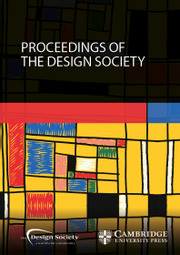Article contents
ENVIRONMENTAL CONSIDERATIONS IN ENGINEERING: SYSTEMIC DIFFERENCES BETWEEN EXPERTS AND NOVICES
Published online by Cambridge University Press: 19 June 2023
Abstract
Engineering knowledge forms an essential part of our planetary fight against climate change. Traditionally, engineering curricula emphasizes the importance of technical knowledge and encourages to specialize in niche areas, where engineers develop themselves into experts. However, it is important to be able to reflect on complex societal challenges from a variety of perspectives to produce not only innovative, but also long-lasting and inclusive solutions for the greater good. This paper aims to understand the extent of systems thinking abilities of engineers by differentiating experts from novices. The study traces sustainability connections made by professional engineers and master's level engineering students when solving engineering design problems. This qualitative study highlights seven recurring themes that relate to the global sustainability discourse and describe a problem-centred approach through a real-life case that focuses on paper and pulp production, through a thematic analysis of 59 responses. The results portray system-level differences in how novice and expert engineers approach sustainability questions and how these differences shape their solution spaces.
Keywords
- Type
- Article
- Information
- Creative Commons
- This is an Open Access article, distributed under the terms of the Creative Commons Attribution-NonCommercial-NoDerivatives licence (http://creativecommons.org/licenses/by-nc-nd/4.0/), which permits non-commercial re-use, distribution, and reproduction in any medium, provided the original work is unaltered and is properly cited. The written permission of Cambridge University Press must be obtained for commercial re-use or in order to create a derivative work.
- Copyright
- The Author(s), 2023. Published by Cambridge University Press
References
- 1
- Cited by




